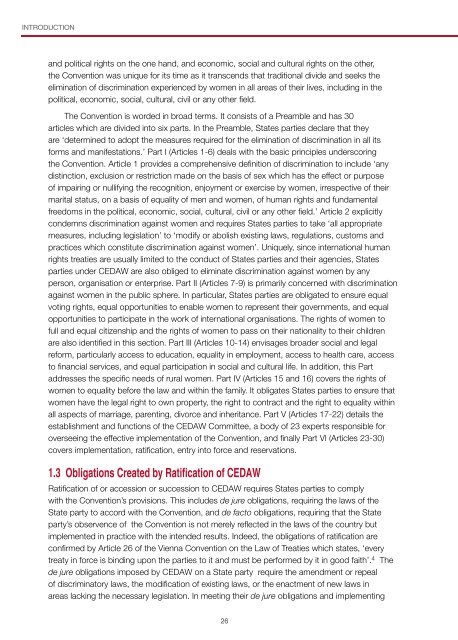Gender Equality Laws - CEDAW Southeast Asia
Gender Equality Laws - CEDAW Southeast Asia
Gender Equality Laws - CEDAW Southeast Asia
You also want an ePaper? Increase the reach of your titles
YUMPU automatically turns print PDFs into web optimized ePapers that Google loves.
INTRODUCTIONand political rights on the one hand, and economic, social and cultural rights on the other,the Convention was unique for its time as it transcends that traditional divide and seeks theelimination of discrimination experienced by women in all areas of their lives, including in thepolitical, economic, social, cultural, civil or any other field.The Convention is worded in broad terms. It consists of a Preamble and has 30articles which are divided into six parts. In the Preamble, States parties declare that theyare ‘determined to adopt the measures required for the elimination of discrimination in all itsforms and manifestations.’ Part I (Articles 1-6) deals with the basic principles underscoringthe Convention. Article 1 provides a comprehensive definition of discrimination to include ‘anydistinction, exclusion or restriction made on the basis of sex which has the effect or purposeof impairing or nullifying the recognition, enjoyment or exercise by women, irrespective of theirmarital status, on a basis of equality of men and women, of human rights and fundamentalfreedoms in the political, economic, social, cultural, civil or any other field.’ Article 2 explicitlycondemns discrimination against women and requires States parties to take ‘all appropriatemeasures, including legislation’ to ‘modify or abolish existing laws, regulations, customs andpractices which constitute discrimination against women’. Uniquely, since international humanrights treaties are usually limited to the conduct of States parties and their agencies, Statesparties under <strong>CEDAW</strong> are also obliged to eliminate discrimination against women by anyperson, organisation or enterprise. Part II (Articles 7-9) is primarily concerned with discriminationagainst women in the public sphere. In particular, States parties are obligated to ensure equalvoting rights, equal opportunities to enable women to represent their governments, and equalopportunities to participate in the work of international organisations. The rights of women tofull and equal citizenship and the rights of women to pass on their nationality to their childrenare also identified in this section. Part III (Articles 10-14) envisages broader social and legalreform, particularly access to education, equality in employment, access to health care, accessto financial services, and equal participation in social and cultural life. In addition, this Partaddresses the specific needs of rural women. Part IV (Articles 15 and 16) covers the rights ofwomen to equality before the law and within the family. It obligates States parties to ensure thatwomen have the legal right to own property, the right to contract and the right to equality withinall aspects of marriage, parenting, divorce and inheritance. Part V (Articles 17-22) details theestablishment and functions of the <strong>CEDAW</strong> Committee, a body of 23 experts responsible foroverseeing the effective implementation of the Convention, and finally Part VI (Articles 23-30)covers implementation, ratification, entry into force and reservations.1.3 Obligations Created by Ratification of <strong>CEDAW</strong>Ratification of or accession or succession to <strong>CEDAW</strong> requires States parties to complywith the Convention’s provisions. This includes de jure obligations, requiring the laws of theState party to accord with the Convention, and de facto obligations, requiring that the Stateparty’s observence of the Convention is not merely reflected in the laws of the country butimplemented in practice with the intended results. Indeed, the obligations of ratification areconfirmed by Article 26 of the Vienna Convention on the Law of Treaties which states, ‘everytreaty in force is binding upon the parties to it and must be performed by it in good faith’. 4 Thede jure obligations imposed by <strong>CEDAW</strong> on a State party require the amendment or repealof discriminatory laws, the modification of existing laws, or the enactment of new laws inareas lacking the necessary legislation. In meeting their de jure obligations and implementing26
















